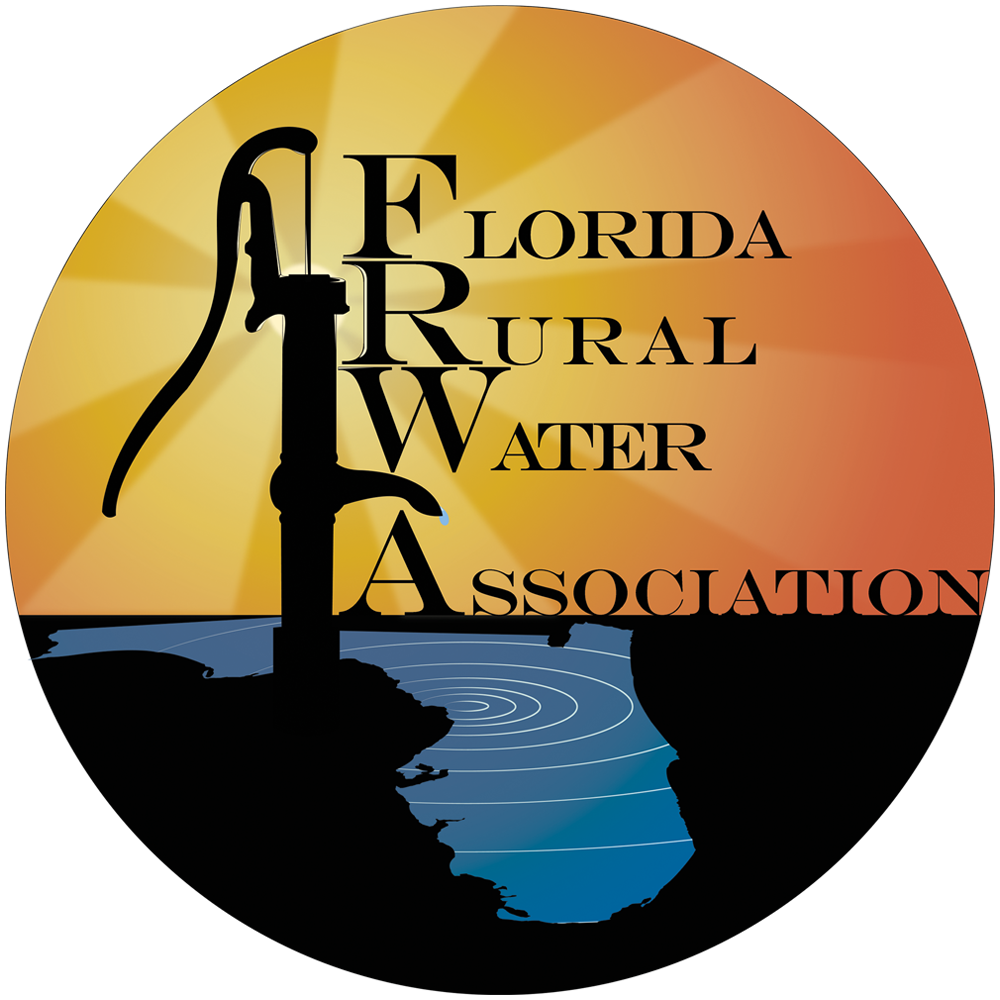Our President Speaks
Pat Cichon, President of the Florida Rural Water Association, recently spoke to the attendees at the FRWA Annual Conference. If you were not able to attend, please see what she had to say below.
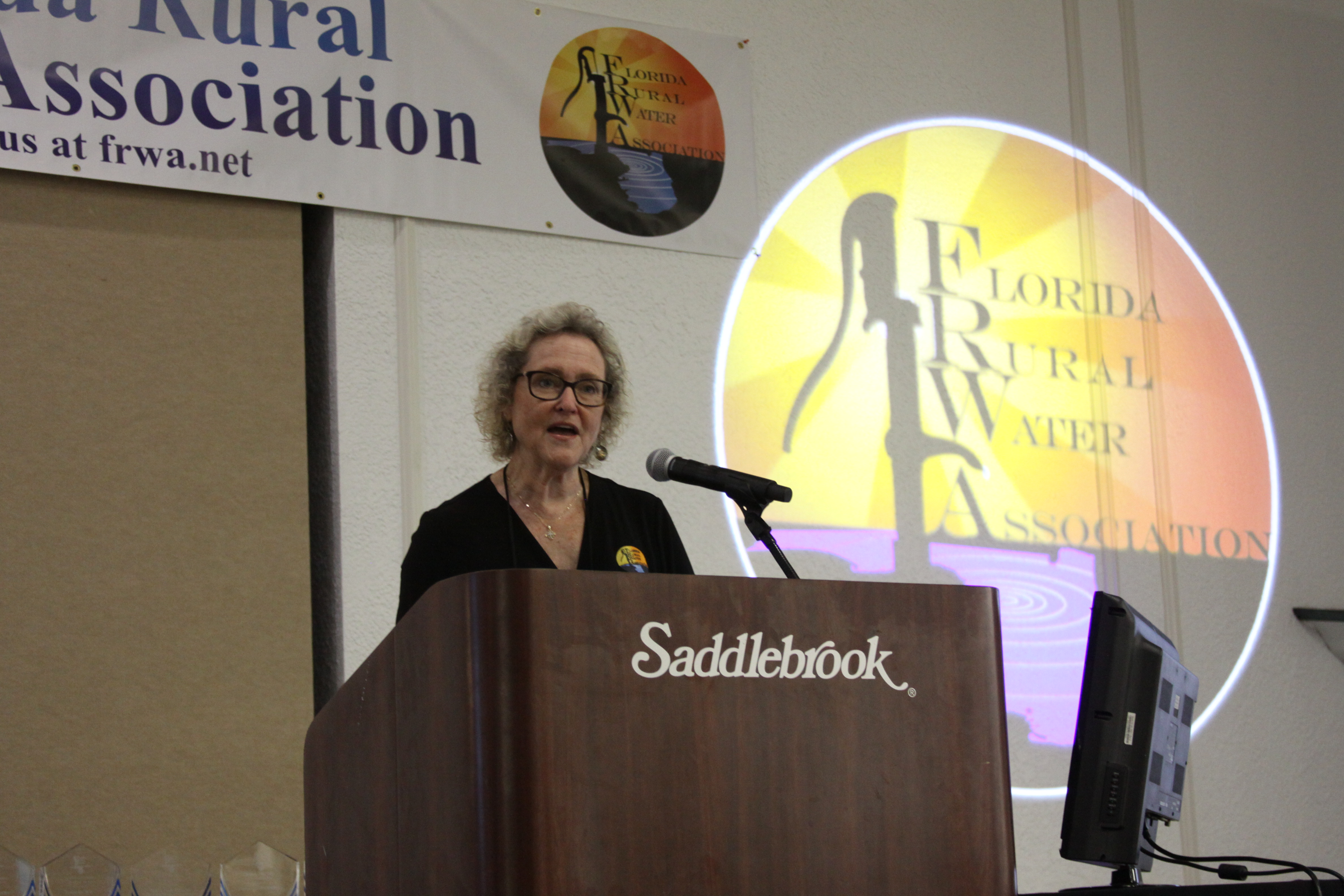 My name is Pat Cichon, and I am the President of the Florida Rural Water Association. It is a pleasure to serve and represent you. Your seven (7) member Board of Directors is proud to serve on your behalf, represent the Water Industry, and lead the Florida Rural Water Association to be the best it can be for you and all our members.
My name is Pat Cichon, and I am the President of the Florida Rural Water Association. It is a pleasure to serve and represent you. Your seven (7) member Board of Directors is proud to serve on your behalf, represent the Water Industry, and lead the Florida Rural Water Association to be the best it can be for you and all our members.
I would like to introduce the other Board Members:
Bruce Morrison – Vice President –NWFWMD area--Niceville
Bill Grubbs – Secretary/Treasurer— At large member--Quincy
Robert Munro – National Director—SJRWMD area--Orlando
Scott Kelly – Director-At Large member—Atlantic Beach
Tom Jackson – Director—SFWMD area—Fort Myers
John Bostic – Director -SWFWMD area—Zephyrhills

FRWA has 43 staff members working for you, providing services and assistance to Drinking Water, Source Water, Wellhead Protection, Wastewater Operations and many more services.
I have found that people either love or hate statistics. I like stats (I’m a baseball fan!!) so I’m going to share a few FRWA Stats with you:
FRWA has:
- 2087 Water and Wastewater Members. 2393 total members.
- 145 new members this year reflecting a 6% growth rate.
- 96% Membership retention rate – Most loss is caused by system consolidation/regionalization and loss of subs under parent memberships.
- FRWA has made 8408 contacts at utilities in 2022 were member systems. We assist non-members also because the help is needed, and we hope they will become members. Our members are the “cream of the crop” within Florida and many times need less compliance and operation assistance than other small systems.
- 651,574 miles were driven by Association staff offering assistance last year, that is an average of 83 miles driven for every contact with systems in Florida in 2023.
- The average time spent per on site contact was 1.5 hours for 2023.
- 54 training sessions were held between June of 2022 and May of 2023 for a total of 3046 attendees. In addition, we held over 32 total preparatory and review sessions in the past two years for potential operators to enter or advance in our water industry profession. In the last 20 years we have held over 2000 instructor lead sessions and trained over 81,000 attendees.
- FRWA has added over 49 different pieces of equipment and has increased the FRWA membership equipment by over $65,881.81 dollars.
- Total Source Water/Wellhead Protection Pans completed between 2022 – 2023 161 Plans.
- There was a total of 222 different systems assisted last year with engineering, consulting, and permitting assistance.
- The average hours spent per engineering project for the last years is 15 hours.
- Total number of systems assisted with rates, fees, or similar studies for the past year was 40
- The AMP Program has had 202 system referrals and have completed 188 of these, with 14 are still remaining and are in some stage of completion.
- Our SRF Inspectors have completed a total of 271 inspections in the last year.
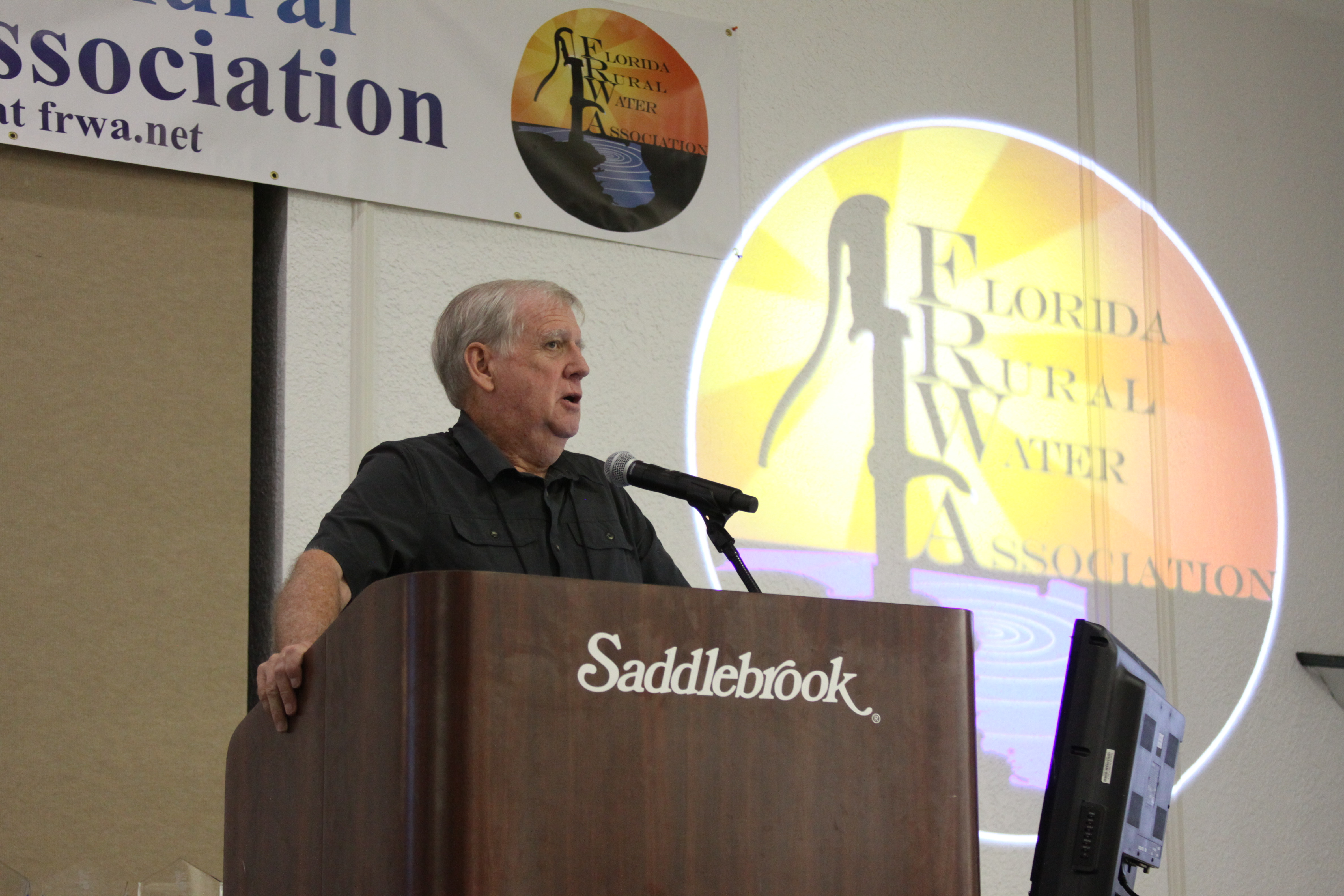 Scott Kelly, another FRWA Board Member continued, you will probably remember that last year we asked for your input and ranking of 14 action items to improve services to you, our members. Please understand that some of these actions will take more than one year to implement, but here’s the progress on your requests.
Scott Kelly, another FRWA Board Member continued, you will probably remember that last year we asked for your input and ranking of 14 action items to improve services to you, our members. Please understand that some of these actions will take more than one year to implement, but here’s the progress on your requests.
Under the overall heading of Utility Workforce (train, retain and recruit), you ranked as #1 More training on upcoming regulations and issues impacting water utilities in Florida so water utilities/staff know how to comply and achieve success.
This past year, FRWA was able to offer more CEU training through Focus on Change sessions, partnering with FDEP. We are focusing on staff training to train water utilities directly, providing more written regulatory updates through the weekly E-news, and plan to offer videos, etc. in the future.
#2 – you wanted more demonstrations at central regional sites.
We know that our water industry is innovative and, faced with an issue, has some very sharp folks that come up with solutions. We are training our FRWA field people who are exposed to those issues and solutions in their travels to capture this innovation and share them on a regional and statewide basis. Central Regional sites will host sessions with multiple or one subject sharing to be videoed or such for sharing across the state. This is an action in progress as we develop the appropriate regional training.
#3 You wanted help with better messaging on how to obtain/retain water utility operators. We are encouraging job fairs, and working with the Florida Legislature and Congress to rank water and wastewater operators as a critical/first responder/essential workforce. It’s about time!!
#4 You wanted more water utility project completion assistance—needed paperwork, documentation, andfunding requirements to get projects completed. FRWA Asset Management Program has teed up more than $400 million worth of projects. Some smaller utilities don’t have the personnel or expertise to move these projects forward.
You asked for more funding and needs advocacy, #5–FRWA representatives to the State Legislature and Congress will always advocate for more funding at these levels. We hope to increase our efforts in future years.
Under the general heading of Equipment, you asked for more equipment borrowing depots #6—regional locations for easier access by water utilities in Florida. We jumped right on this one and added warehouse space in Gainesville. As other specific needs (lead inventory, etc) are evident, we will work to supply needed equipment in other regions.
You asked for more messaging on needed O&M on equipment to protect assets. #8 Our staff is working to create, distribute and implement reminders, step-by-step information, and schedules on all critical assets for member use and proactiveness. There is at least one session in the DW/WW track that addresses maintenance and reliability of equipment.
Under the heading of Utility Customer Relations, #9 How do we educate our customers on emerging issues like UCMR sampling/reporting, PFAS, chemical shortages, wastewater laws and rules forthcoming. First, you must understand the issues and there are sessions on PFAS, sampling and rules.
#10 How do we message our water utility customers on causes of spills/SSO/overflows. And educate them on why flushing disposable wipes, other non-domestic wastewater causes blockages, breakage, backups that result in spill and environmental issues.
#11 How do we communicate and partner with Schools and Childcares to improve Children’s health with lead sampling and remediation of facility fixtures, faucets, and materials. This afternoon there is a session on the Lead in Schools program.
#12 Can we develop Bill Stuffers/positive messaging for water utility customers to educate on issues and requirements that may affect their water service, rates, water availability etc.
We are developing these messages and ask that if any of you have had success with messages please share and we will make them generic to other utilities to fill in, post and promote.
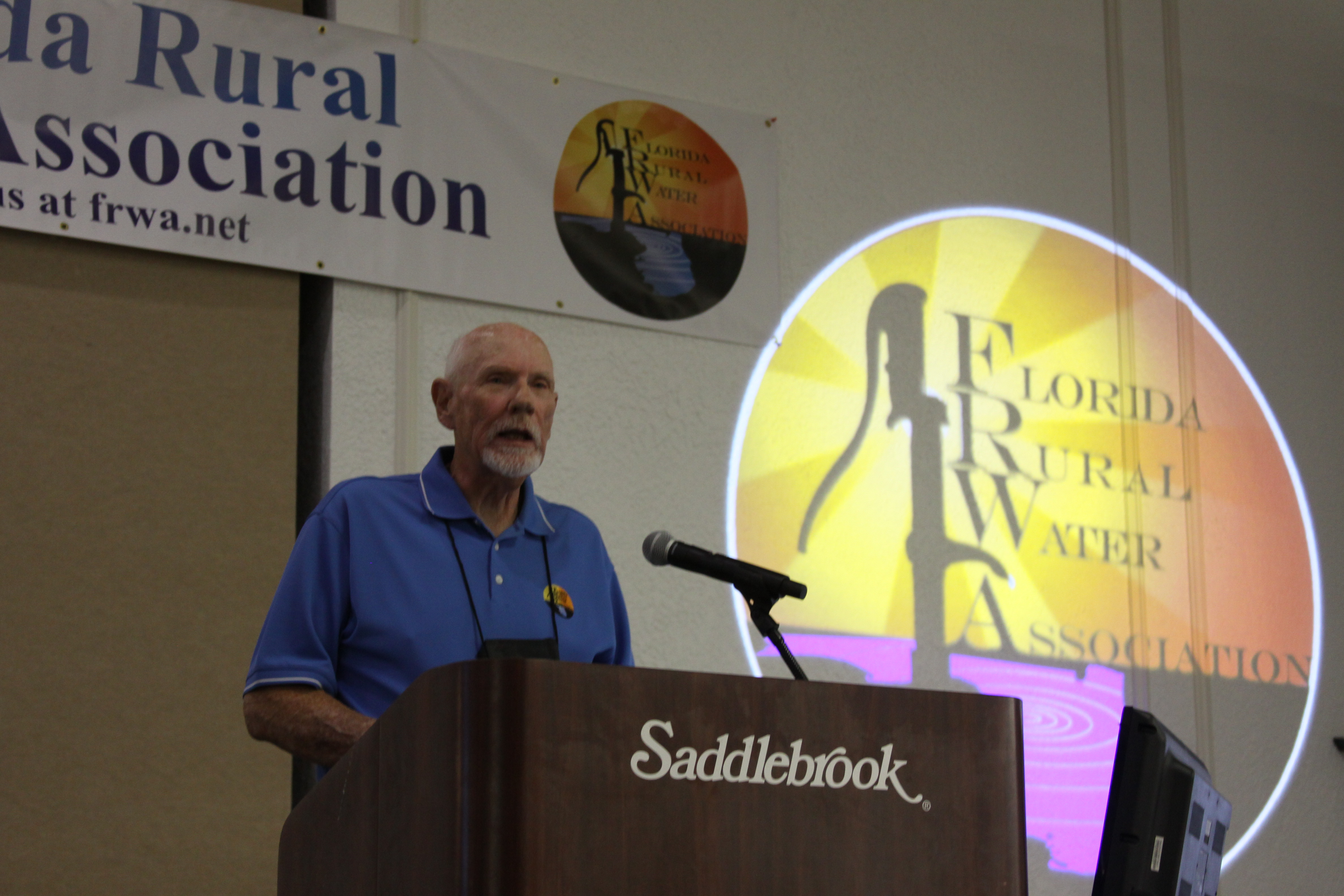 Tom Jackson, continued as he explained our new Legal Assistance Program that provides for member water utilities on limited issues/services as a membership service.
Tom Jackson, continued as he explained our new Legal Assistance Program that provides for member water utilities on limited issues/services as a membership service.
During the opening session of FRWA Annual Conference in 2021, the membership was asked to rank 14 additional services that we could provide. A Legal Assistance Program was ranked as #12. At the 2022 Annual Conference we reported that we were “still brainstorming on how to help our members with legal assistance on such things as bylaws, operating agreements, etc.”
Since that time, staff has talked with the attorneys listed above and a meeting was scheduled. After much discussion, it was decided that each attorney will initially work with a utility to review its governance documents and decide which attorney would continue according to his area of expertise. Mr. Buhr has a background in dealing with governmental utilities; Mr. Dooley with non-profits; and Mr. Friedman with private, for-profits. Another attorney, Fred Aschauer, might be available to assist with DEP regulatory issues.
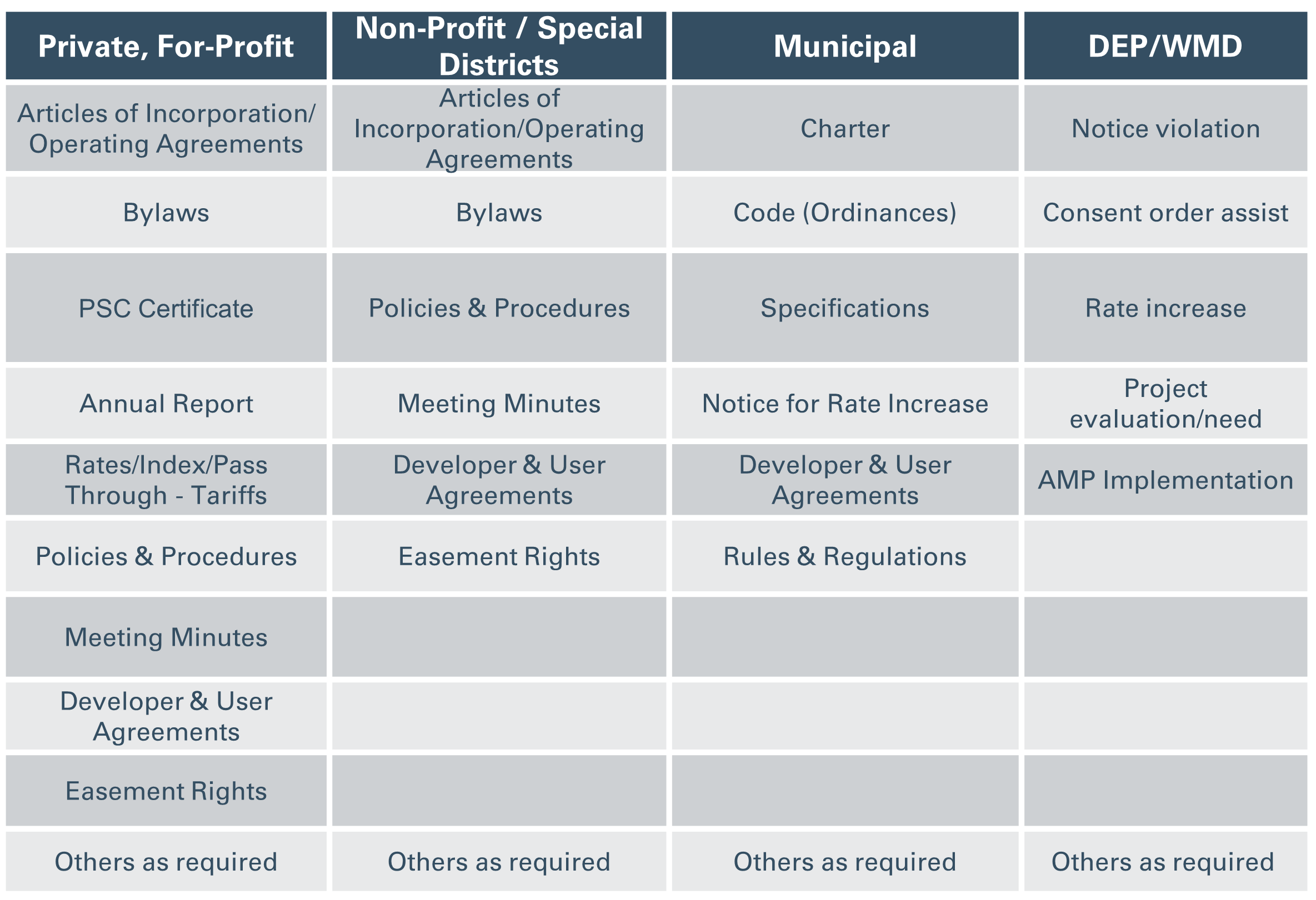
This would provide an opportunity to establish a working relationship between the attorney and utility. If more in-depth legal assistance is desired, FRWA would step aside and leave it between the attorney and utility.
Other points of discussion regarding the scope of initial legal review:
• The attorneys agreed to charge no more than $1,500 for the 4-5 hours required to conduct the review of governance documents.
• The attorneys will not provide a legal opinion, only recommendations.
• They will not represent the utility in any litigation.
• The deliverable might be a document red-line that the utility can adopt, modify or reject.
• All would look for ways in which the utility could reduce expenditures or financial exposure, and/or increase income.
• The utility would submit the $1,500 to FRWA who would hold the fee until the review is complete.
Scott Kelly continued with comments on our Legislative efforts. #10 More legislative alerts, issues communications, advocacy requests from FRWA to members to engage the State Legislative process and to contact their State Representatives and Senators.
We have a very effective lobbyist in Tallahassee, and he works very hard on behalf of our industry. But if there was an issue before the Governor, would you all use a form letter or message to encourage a decision in favor of water/wastewater utilities. We could put this form letter out on our website.
